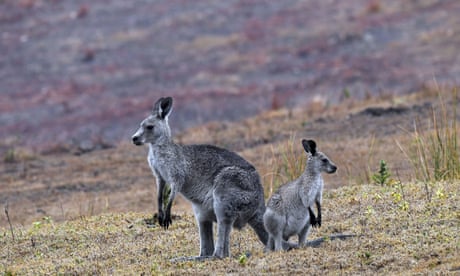- by foxnews
- 08 Apr 2025
Why is the EU under pressure to ban kangaroo products and how will it affect Australia?
Why is the EU under pressure to ban kangaroo products and how will it affect Australia?
- by theguardian
- 20 Mar 2022
- in news

The European Union is under pressure to ban the import of kangaroo products following a push from a Dutch animal rights party, a move that if successful could collapse the kangaroo export market.
It follows a push to ban the import of kangaroo leather to the US. Legislation to stop the import of kangaroo products was introduced to congress last year but has not progressed.
The push to ban kangaroo imports has been led by the Dutch Party for Animals, which is allied with the Animal Justice party in Australia.
In 2018 it hosted a screening of an anti-kangaroo hunting film in The Hague, and also hosted New South Wales Animal Justice party MP Mark Pearson, who addressed a group of about 80 people in the European parliament.
All animal products imported to the EU from Australia must be produced in a manner that complies with Australian animal welfare standards and EU import requirements. The EU regularly audits the products, most recently in 2019, and found they met all requirements.
About 1.5m wild kangaroos are killed in commercial harvesting operations in Australia each year, although the number can vary due to demand and drought. The target species are eastern grey, western grey, and red kangaroos and common wallaroos, none of which are listed as threatened species and all of which are considered abundant.
The harvesting is undertaken at night by commercial shooters, who are required to pass accuracy and competency tests and to kill with a single shot to the brain. The carcasses are then eviscerated and prepared for transport, which frequently involves removing the head. They must be delivered to a chiller truck by dawn.
Animal welfare advocates say that the removal of the kangaroo heads, which is not done by all shooters and not a requirement, makes it impossible to check the accuracy of kill shots. They have also raised concerns about the lack of on-the-ground audits, which would assess damage to animals left behind.
But the biggest animal welfare concern is the treatment of joeys. Most female kangaroos of breeding age will have a joey in their pouch or at foot, and those joeys cannot survive without their mother. They are killed by blunt force trauma.
Pearson is a long-term opponent of the commercial kangaroo harvest. In October, a parliamentary inquiry in NSW, of which he was the deputy chair, found issues with the transparency of the methodology used to estimate kangaroo and wallaby populations, and found there was a lack of monitoring and regulation at the point of kill for both commercial and non-commercial operations.
The inquiry also found that the NSW parks and wildlife services did not have adequate systems to monitor compliance with licence conditions for non-commercial culling of kangaroos, usually carried out by landholders.
He said the trade could not be conducted in a humane manner, because even if all commercial shooters were accurate they must still deal with the joeys. And he said the accuracy of shooters cannot be guaranteed without on-the-ground audits, which are not taking place.
She said there had been a lack of national leadership on kangaroo harvesting, leaving behind a complex, polarising debate with few agreed-upon truths.
Scientists who support commercial kangaroo harvesting say that if Europe were to ban the import, it would remove the most humane method of kangaroo population management, leading to more animals starving due to overgrazing or more animals being killed through non-commercial culls, which are carried out by less-skilled shooters.
But leading ecologists have also called for a national kangaroo strategy, which considers population management through the lens of managing the level of resources available in an ecosystem to support kangaroos, and not a quota based on how many animals the industry will take.
The statement was endorsed by 25 groups including Bush Heritage Australia, NSW Farmers, the Australian Veterinary Conservation Biology Group, the Indigenous Land and Sea Corporation and the Conservation Council of Australia.
Dr John Read, one of the eight authors, told Guardian Australia that commercial kangaroo harvesting was preferable to other outcomes when dealing with overabundant kangaroo populations.
- by foxnews
- descember 09, 2016
Ancient settlement reveals remains of 1,800-year-old dog, baffling experts: 'Preserved quite well'
Archaeologists have recently unearthed the remarkably well-preserved remains of a dog from ancient Rome, shedding light on the widespread practice of ritual sacrifice in antiquity.
read more


